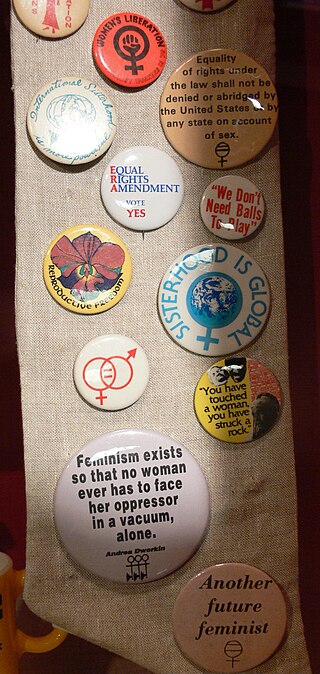Related Research Articles
Feminism is a range of socio-political movements and ideologies that aim to define and establish the political,economic,personal,and social equality of the sexes. Feminism holds the position that modern societies are patriarchal—they prioritize the male point of view—and that women are treated unjustly in these societies. Efforts to change this include fighting against gender stereotypes and improving educational,professional,and interpersonal opportunities and outcomes for women.
Women's studies is an academic field that draws on feminist and interdisciplinary methods to place women's lives and experiences at the center of study,while examining social and cultural constructs of gender;systems of privilege and oppression;and the relationships between power and gender as they intersect with other identities and social locations such as race,sexual orientation,socio-economic class,and disability.

Transfeminism,or trans feminism,is a branch of feminism focused on transgender women and informed by transgender studies. Transfeminism focuses on the effects of transmisogyny and patriarchy on trans women. It is related to the broader field of queer theory. The term was popularized by Emi Koyama in The Transfeminist Manifesto.
Feminist theory is the extension of feminism into theoretical,fictional,or philosophical discourse. It aims to understand the nature of gender inequality. It examines women's and men's social roles,experiences,interests,chores,and feminist politics in a variety of fields,such as anthropology and sociology,communication,media studies,psychoanalysis,political theory,home economics,literature,education,and philosophy.
Marxist feminism is a philosophical variant of feminism that incorporates and extends Marxist theory. Marxist feminism analyzes the ways in which women are exploited through capitalism and the individual ownership of private property. According to Marxist feminists,women's liberation can only be achieved by dismantling the capitalist systems in which they contend much of women's labor is uncompensated. Marxist feminists extend traditional Marxist analysis by applying it to unpaid domestic labor and sex relations.

Intersectionality is a sociological analytical framework for understanding how groups' and individuals' social and political identities result in unique combinations of discrimination and privilege. Examples of these factors include gender,caste,sex,race,ethnicity,class,sexuality,religion,disability,height,age,and weight. These intersecting and overlapping social identities may be both empowering and oppressing. However,little good-quality quantitative research has been done to support or undermine the practical uses of intersectionality.
“Feminist political ecology”examines how power,gender,class,race,and ethnicity intersect with environmental ‘crises’,environmental change and human-environmental relations. Feminist political ecology emerged in the 1990s,drawing on theories from ecofeminism,feminist environmentalism,feminist critiques of development,postcolonial feminism,and post-structural critiques of political ecology. Specific areas in which feminist political ecology is focused are development,landscape,resource use,agrarian reconstruction,rural-urban transformation,intersectionality,subjectivities,embodiment,emotions,communication,situated knowledge,posthumanism,deconstructing theory-practice dichotomies,ethics of care and decolonial feminist political ecology. Feminist political ecologists suggest gender is a crucial variable –in relation to class,race and other relevant dimensions of political ecological life –in constituting access to,control over,and knowledge of natural resources.
Barbara Godard was a Canadian critic,translator,editor,and academic. She held the Avie Bennett Historica Chair of Canadian Literature and was Professor of English,French,Social and Political Thought and Women's Studies at York University. She published widely on Canadian and Quebec cultures,on feminist and literary theory,and on translation studies. Barbara Godard died in Toronto on May 16,2010. Across Canada and throughout the world,poets,scholars,feminists,and friends mourned her death.

Kathleen O'Grady is a Canadian author and academic. She has published two children's books,but is more widely known as a feminist scholar who investigates women's health issues through a cultural lens and whose work addresses the under-researched intersection between feminism and the study of religion. She is also a past Editor of Network, the national,bilingual health magazine for Canadian women,and has published several books addressing feminist theory and methodology.

A variety of movements of feminist ideology have developed over the years. They vary in goals,strategies,and affiliations. They often overlap,and some feminists identify themselves with several branches of feminist thought.
Valerie Henitiuk is a scholar researching aspects of the intersection of translation studies,world literature,Inuit literature,Japanese literature,and women's writing. She is a Canadian citizen,recently retired as Vice-president Academic &Provost at Concordia University of Edmonton. Henitiuk has been a visiting scholar at both Harvard and Columbia Universities in the US and at Kokugakuin University in Japan. She was previously executive director of the Centre for the Advancement of Faculty Excellence and Professor of English at Grant MacEwan University in Edmonton,Alberta,on the faculty of the University of East Anglia (UK) and Director of the British Centre for Literary Translation (BCLT).

Ecofeminism is a branch of feminism and political ecology. Ecofeminist thinkers draw on the concept of gender to analyse the relationships between humans and the natural world. The term was coined by the French writer Françoise d'Eaubonne in her book Le Féminisme ou la Mort (1974). Ecofeminist theory asserts a feminist perspective of Green politics that calls for an egalitarian,collaborative society in which there is no one dominant group. Today,there are several branches of ecofeminism,with varying approaches and analyses,including liberal ecofeminism,spiritual/cultural ecofeminism,and social/socialist ecofeminism. Interpretations of ecofeminism and how it might be applied to social thought include ecofeminist art,social justice and political philosophy,religion,contemporary feminism,and poetry.

Gail Scott is a Canadian novelist,short story writer,essayist and translator,best known for her work in experimental forms such as prose poetry and New Narrative. She was a major contributor to 1980s Québécoise feminist language theory,known as écriture au féminin, which explores the relationship between language,bodies,and feminist politics. Many of her novels and stories deal with fragmentation in time,in subjects,and in narrative structures.

Chandra Talpade Mohanty is a Distinguished Professor of Women's and Gender Studies,Sociology,and the Cultural Foundations of Education and Dean's Professor of the Humanities at Syracuse University. Mohanty,a postcolonial and transnational feminist theorist,has argued for the inclusion of a transnational approach in exploring women’s experiences across the world. She is author of Feminism Without Borders:Decolonizing Theory,Practicing Solidarity,and co-editor of Third World Women and the Politics of Feminism,Feminist Genealogies,Colonial Legacies,Democratic Futures,Feminism and War:Confronting U.S. Imperialism,,The Sage Handbook on Identities,and Feminist Freedom Warriors:Genealogies,Justice,Politics,and Hope.
Technofeminism explores the role gender plays in technology. It is often examined in conjunction with intersectionality,a term coined by KimberléCrenshaw which analyzes the relationships among various identities,such as race,socioeconomic status,sexuality,gender,and more. However,many scholars,such as Lori Beth De Hertogh,Liz Lane,and Jessica Oulette,as well as Angela Haas,have spoken out about the lack of technofeminist scholarship,especially in the context of overarching technological research.
White feminism is a term which is used to describe expressions of feminism which are perceived as focusing on white women while failing to address the existence of distinct forms of oppression faced by ethnic minority women and women lacking other privileges. Whiteness is crucial in structuring the lived experiences of white women across a variety of contexts. The term has been used to label and criticize theories that are perceived as focusing solely on gender-based inequality. Primarily used as a derogatory label,"white feminism" is typically used to reproach a perceived failure to acknowledge and integrate the intersection of other identity attributes into a broader movement which struggles for equality on more than one front. In white feminism,the oppression of women is analyzed through a single-axis framework,consequently erasing the identity and experiences of ethnic minority women in the space. The term has also been used to refer to feminist theories perceived to focus more specifically on the experience of white,cisgender,heterosexual,able-bodied women,and in which the experiences of women without these characteristics are excluded or marginalized. This criticism has predominantly been leveled against the first waves of feminism which were seen as centered around the empowerment of white middle-class women in Western societies.

Luise F. Pusch is a German linguist. She is regarded as the co-founder of feminist linguistics in Germany,along with Senta Trömel-Plötz.
Dalal Khalil Safadi was a Lebanese writer and translator. Considered a pioneer in the short story genre among Middle Eastern women,she was the first woman to publish a short story collection in Iraq.
The Canadian School of Feminist Translation is a school of thought that originated from the works of several Canadian authors and translators. The School emphasizes the role of Canadian translators in coining the term "feminist translation". It is a practice that prioritizes the importance of translators in the history of feminism and advocates for the rights of women to obtain feminist theory,writings,and material in their native languages. Canada's bilingual nature played a major part in developing feminist translation largely because of the built-in gender binary of the French language.
May Muzaffar is a Jordan-based Iraqi poet,short story writer,translator,and editor.
References
- ↑ "von FLOTOW, Luise".
- ↑ "Prof. Luis von Flotow".
- 1 2 "Luise von Flotow - University of Wisconsin-Milwaukee".
- ↑ "CONVOCATORIA REVISTA MUTATIS MUTANDIS: HACIA UNA TRADUCTOLOGÍA FEMINISTA TRANSNACIONAL".
- ↑ "Towards Transnational Feminist Translation Studies".
- ↑ "Luise von Flotow".
- ↑ "JALDA's Interview with Professor Luise von Flotow".
- ↑ "GLOBAL FEMINIST TRANSLATORS UNITE!: "THE ROUTLEDGE HANDBOOK OF TRANSLATION, FEMINISM, AND GENDER," EDITED BY LUISE VON FLOTOW AND HALA KAMAL".
- ↑ "Translation Theme Semester: Rackham Centennial Lecture, Professor Luise von Flotow".
- ↑ "People Directory".
- ↑ "INTERVENANTS / PARTICIPANTS" (PDF).
- ↑ "Luise von Flotow (University of Ottawa): The "letter" of the text: when women translate the Bible word-for-word".
- ↑ "Translation and Gender: Translating in the 'Era of Feminism' by Luise von Flotow (review)".
- ↑ "Feminist Translation: Contexts, Practices and Theories" (PDF).
- ↑ "Translating women".
- ↑ "Luise von Flotow & Farzaneh Farahzad, eds. Translating Women: Different Voices and New Horizons".
- ↑ "Translating Women : from recent histories and re-translations to "Queerying" translation, and metramorphosis".
- ↑ "Contested Gender in Translation: Intersectionality and Metramorphics".
- ↑ "Book Review: the Routledge Handbook of Translation and Ethics".
- ↑ "Gender in audiovisual translation studies".
- ↑ "The Politics of Translation in the Middle Ages and the Renaissance".
- ↑ "Translating Canada".
- ↑ "Kathy Mezei, Sherry Simon & Luise von Flotow, eds. Translation effects: The shaping of modern Canadian culture".